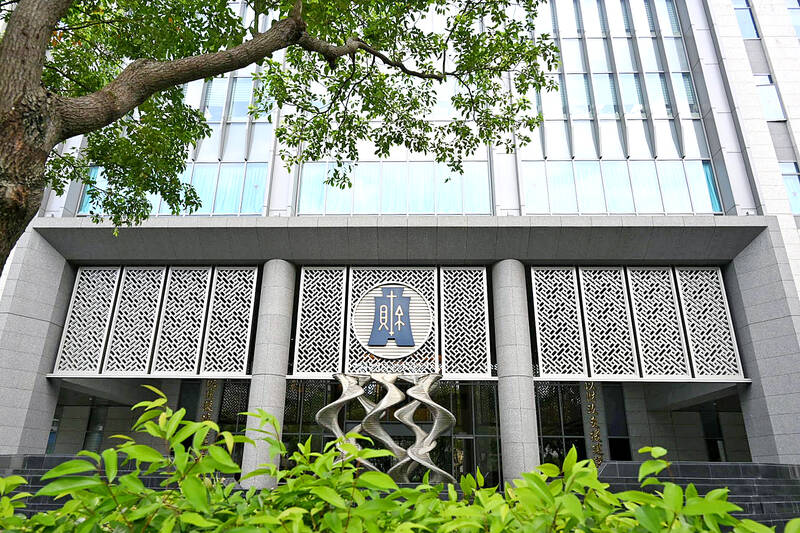Tax revenue last year gained 5.7 percent from 2022 to a record NT$3.43 trillion (US$110.28 billion), beating the government budget target by 11.8 percent, or NT$361.7 billion in excess tax revenue, the Ministry of Finance (MOF) said yesterday.
The actual excess could rise to a range of NT$380 billion to NT$391 billion after the arrival of delayed tax revenue, ministry statistics official Liang Kuan-hsuan (梁冠璇) said.
The excess tax revenue came because the ministry had no way of foreseeing five interest rate hikes by the central bank to curb inflation that helped inflate

Photo: Chang Chia-ming, Taipei Times
business tax revenue to NT$560.9 billion, Liang said
Furthermore, the ministry could not have predicted the rallies in local tech shares that raised full-year securities transaction tax revenue by 12.4 percent to NT$197.3 billion, the second-highest in history, she said.
Liang attributed the rallies to the world’s keen interest in artificial intelligence equipment and solutions, which benefit local firms and their global supply chains.
Personal income tax revenue represented another bright spot with a 14.4 percent advance to NT$749.7 billion, thanks to upward wage and interest rate adjustments among other things, Liang said.
Altogether, revenues from the gifts and inheritances tax, sales tax, corporate income tax, entertainment tax, deed tax and house tax more than met the budget target, she added.
Only revenue from liquor and tobacco taxes as well as land value increment tax lagged behind the ministry’s projection, Liang said, adding that property transactions have since July last year staged a rebound.
The government is looking at a slowdown in tax revenue this year as some manufacturing sectors last year took a hit from sharp inflation, monetary tightening and geopolitical tensions, unfavorable factors that would continue to have an impact, Liang said.

CHIP RACE: Three years of overbroad export controls drove foreign competitors to pursue their own AI chips, and ‘cost US taxpayers billions of dollars,’ Nvidia said China has figured out the US strategy for allowing it to buy Nvidia Corp’s H200s and is rejecting the artificial intelligence (AI) chip in favor of domestically developed semiconductors, White House AI adviser David Sacks said, citing news reports. US President Donald Trump on Monday said that he would allow shipments of Nvidia’s H200 chips to China, part of an administration effort backed by Sacks to challenge Chinese tech champions such as Huawei Technologies Co (華為) by bringing US competition to their home market. On Friday, Sacks signaled that he was uncertain about whether that approach would work. “They’re rejecting our chips,” Sacks

It is challenging to build infrastructure in much of Europe. Constrained budgets and polarized politics tend to undermine long-term projects, forcing officials to react to emergencies rather than plan for the future. Not in Austria. Today, the country is to officially open its Koralmbahn tunnel, the 5.9 billion euro (US$6.9 billion) centerpiece of a groundbreaking new railway that will eventually run from Poland’s Baltic coast to the Adriatic Sea, transforming travel within Austria and positioning the Alpine nation at the forefront of logistics in Europe. “It is Austria’s biggest socio-economic experiment in over a century,” said Eric Kirschner, an economist at Graz-based Joanneum

BUBBLE? Only a handful of companies are seeing rapid revenue growth and higher valuations, and it is not enough to call the AI trend a transformation, an analyst said Artificial intelligence (AI) is entering a more challenging phase next year as companies move beyond experimentation and begin demanding clear financial returns from a technology that has delivered big gains to only a small group of early adopters, PricewaterhouseCoopers (PwC) Taiwan said yesterday. Most organizations have been able to justify AI investments through cost recovery or modest efficiency gains, but few have achieved meaningful revenue growth or long-term competitive advantage, the consultancy said in its 2026 AI Business Predictions report. This growing performance gap is forcing executives to reconsider how AI is deployed across their organizations, it said. “Many companies

France is developing domestic production of electric vehicle (EV) batteries with an eye on industrial independence, but Asian experts are proving key in launching operations. In the Verkor factory outside the northern city of Dunkirk, which was inaugurated on Thursday, foreign specialists, notably from South Korea and Malaysia, are training the local staff. Verkor is the third battery gigafactory to open in northern France in a region that has become known as “Battery Valley.” At the Automotive Energy Supply Corp (AESC) factory near the city of Douai, where production has been under way for several months, Chinese engineers and technicians supervise French recruits. “They